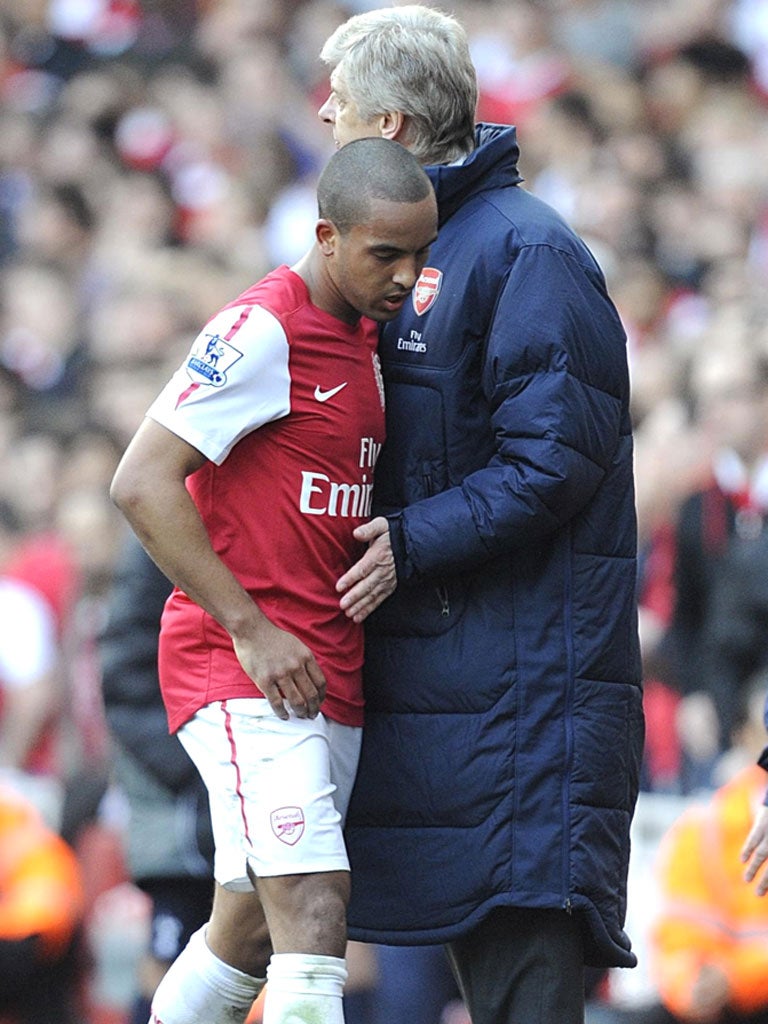Walcott finds his Zagreb zest when he needs it most

Arsenal were treated to a series of reversals yesterday. They overturned a two-goal lead, overwhelmed their opponents in midfield, cut a 10-point deficit by three and staunched a flow of criticism and discontent. The rousing comeback also inspired the very best of Theo Walcott, cleansing him of his doubts and fears, bringing out of him the lethal forward only rarely witnessed since his Zagreb hat-trick three and a half years ago.
For many at the Emirates, Walcott represents what most frustrates them about the last few years at Arsenal: the skittishness, the nervousness, the sense of unfulfilled promise. He is blamed for much that goes wrong here, and the fans' preference for Alex Oxlade-Chamberlain suggests a feeling that his chance at Arsenal is already passing.
Walcott's start did little to persuade his doubters otherwise. When Arsenal were two down he was almost through on goal but, showing his characteristic faltering nerve, squared the ball to Robin van Persie, and the attack collapsed. The fans were exasperated, and let him know it. Wenger admitted he considered mercifully withdrawing him. "The crowd was starting to get on his back, and you wonder if you do him a favour if you leave him on," he said.
But Arsène Wenger is famously patient. He added: "He is a player who can be straight, go behind the defenders, and nobody else is like that. Considering the balance of our team I felt it was important to keep him in the side."
On a different day it could have ended in tears, and more mutinous eruptions from the fans. But this was a remarkable afternoon, Arsenal's best home performance since that famous defeat of Barcelona one year and10 days ago.
Wenger's players fought like they knew how high the stakes were: not just Champions League football next season, and not even north London supremacy, as important as they are, but the credible future of their manager.
Mikel Arteta and Tomas Rosicky ran and hassled and tackled like they knew this. They were level before Rosicky exchanged passes with Bacary Sagna and tucked Arsenal into the lead.
The atmosphere had reversed. Last year Tottenham were 2-0 down in this game and won 3-2. But this took 11 minutes of play, not 35. And, just as the crowd's negativity can infect Walcott, so too can the opposite. After an hour, Walcott charged back down the right-wing, tracking Benoit Assou-Ekotto before dispossessing him with a tackle. The crowd roared approval.
Walcott was transformed; not the frustrator of Arsenal's best hopes but their carrier. Rather than being scared of important opportunities, he was desperate for them. Kieran Gibbs stole the ball from Gareth Bale, telling enough in itself, and Rosicky played it up to Van Persie, who held off Ledley King and Younes Kaboul.
Walcott tore forward from nowhere, received the pass from his captain and chipped Brad Friedel. If there was any confusion, caution or self-doubt in him, he did not show it.
Even at futuristic, scientific Arsenal, momentum and confidence can still be overwhelming. And, three minutes later, Walcott repeated the trick. This time Alex Song won the ball in midfield, Walcott ran in behind Kaboul, received the pass and fired into the far bottom corner. Half an hour earlier it would have been unthinkable. Now it felt inevitable.
When Rosicky cut in from the right and played a deft one-two with Walcott, you wondered what had become of the stumbling imprecisions of the first half. When Walcott was given a rapturous standing ovation with nine minutes left, you wondered what had become of the exasperated masses.
The answer is this was a Walcott fuelled by inspirational team-mates. "It shows the character of the team," he said. "If you work hard hopefully good things will come to you."
Join our commenting forum
Join thought-provoking conversations, follow other Independent readers and see their replies
Comments